In general, taking care of goats on a homestead is like caring for a large dog. You need food, water, shelter, and basic veterinary needs. However, the amount and type of food, access to fresh water, and having a fenced in area will demand extra care for goats.
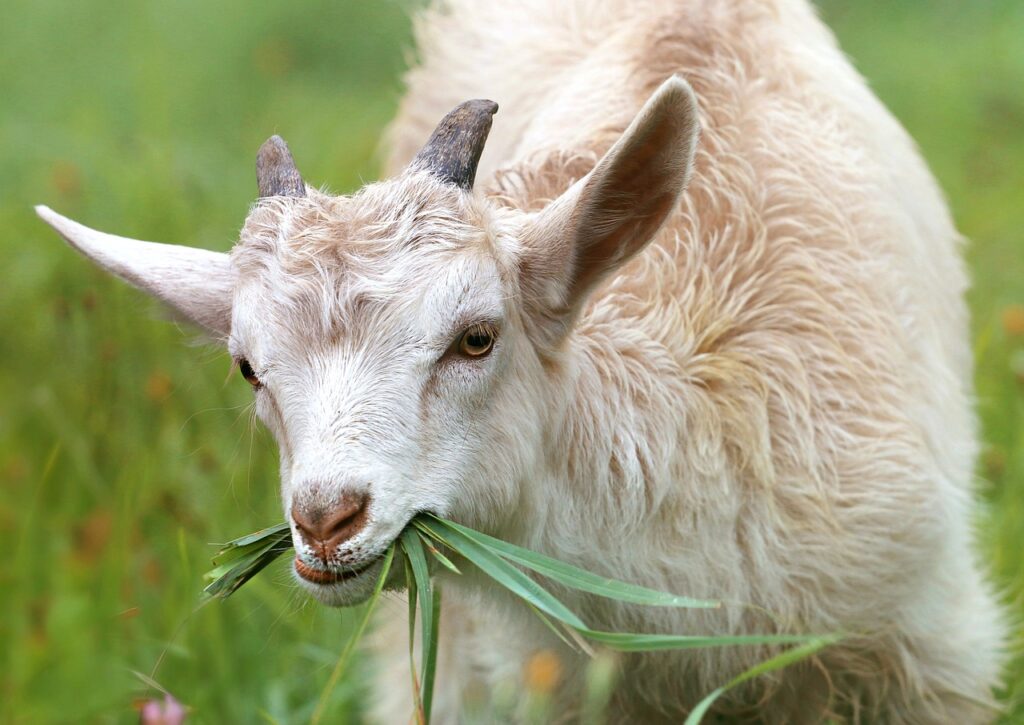
How Much Space Does One Goat Need?
The amount of space needed for a goat depends on a few factors such as the size of the goat, the breed, and whether the goat will be kept indoors or outdoors.
As a general rule of thumb, a single adult goat needs a minimum of 200 square feet of space to move around comfortably. This includes the space for a shelter, feed, and water. However, if you have more than one goat, you will need to increase the space accordingly.
For grazing purposes, a goat requires at least 250 square feet of pasture per goat, but this can vary depending on the quality of the pasture and the breed of the goat.
How Many Goats Per Acre
In general, 2 to 10 goats can be kept on an acre of pasture. However, if pasture is lacking in vegetation like grass or weeds supplemental feed will need to be given.
How Do I Transport My Goats Home
Transporting goats safely and comfortably requires careful planning and preparation.
- Prepare a sturdy and well-ventilated transport vehicle. Goats can be transported in a trailer, truck bed, or other suitable vehicle. Make sure the vehicle has a non-slip surface and is clean and free of sharp edges or objects that could harm the goats.
- Create a comfortable and secure space for the goats. Line the transport vehicle with clean straw, hay, or shavings to provide a comfortable and absorbent surface. Make sure the goats are securely contained in the vehicle, using sturdy gates or panels to prevent them from jumping or falling out during transport.
- Load the goats into the transport vehicle carefully. Use a ramp if needed and gently guide the goats into the vehicle. Make sure to load them in a way that distributes their weight evenly, to prevent the vehicle from tipping or becoming unstable.
- Provide food, water, and rest breaks during transport. Goats need access to fresh water and hay or feed during transport, so make sure to bring enough supplies for the journey. Stop periodically to give the goats a chance to rest and stretch their legs.
- Monitor the goats during transport. Keep an eye on the goats for signs of stress, such as excessive vocalization, panting, or restlessness. If you notice any signs of distress, pull over and check on the goats to make sure they are comfortable and safe.
By following these steps, you can transport your goats safely and comfortably to their new home.
What Do I Need For A Goat Shelter?
Providing a safe and comfortable shelter for your goats is essential for their health and well-being. Most shelters can be made to form three sides, with an open area for grazing. For the rest of the shelter, use the following:
- Structural materials: The shelter should be made of sturdy and durable materials such as wood or metal. The structure should be able to withstand harsh weather conditions and protect the goats from predators.
- Roofing materials: The shelter should have a solid roof to protect the goats from rain, snow, and excessive sunlight. You can use corrugated metal roofing, shingles, or other suitable materials for the roof.
- Flooring materials: The floor of the shelter should be made of a non-slip material that is easy to clean, such as concrete or rubber mats. This will help prevent injury and keep the shelter clean and hygienic.
- Bedding: Provide bedding material such as straw or wood shavings to keep the goats comfortable and absorb moisture. Change the bedding regularly to prevent the buildup of manure and urine, which can lead to health issues.
- Feeding and watering equipment: Install a feeder and waterer inside the shelter to provide easy access to food and water. You can use buckets or automatic watering systems for water, and hay racks or feeders for food.
- Ventilation: Adequate ventilation is important to prevent respiratory issues and keep the shelter dry. Install windows or vents to allow fresh air to circulate inside the shelter.
- Security: Make sure the shelter is secure and protect the goats from predators. Install sturdy gates or panels to prevent predators from entering the shelter.
By providing a shelter that meets these requirements, you can ensure that your goats have a safe and comfortable place to live.
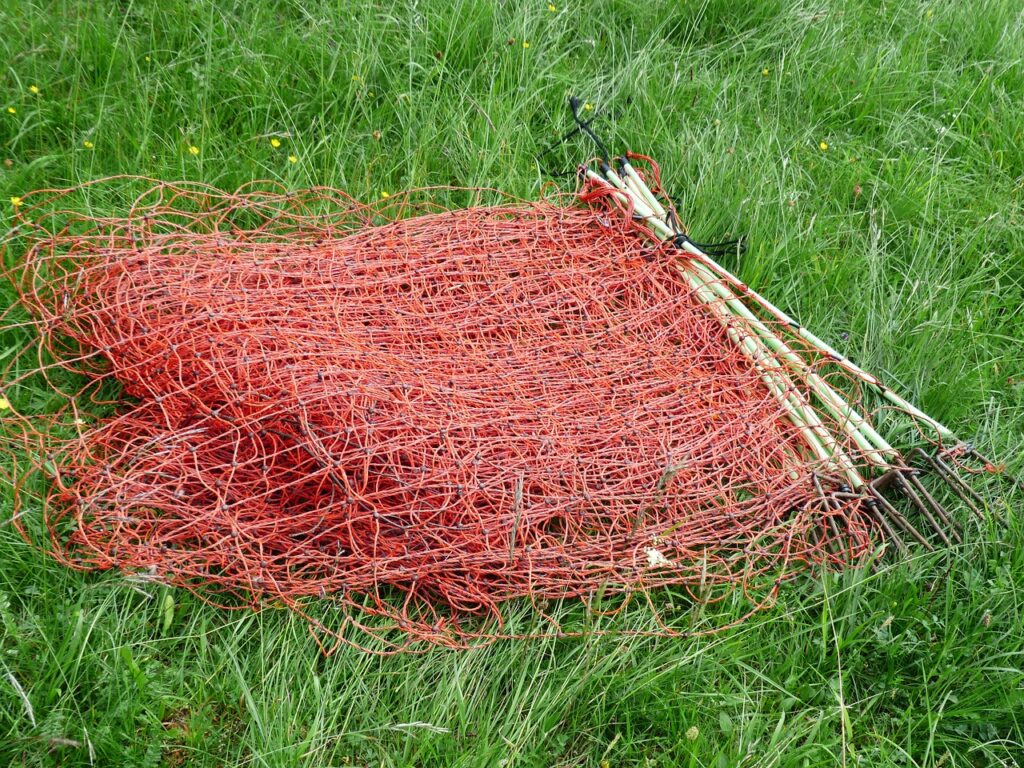
What Kind Of Fencing Do Goats Need?
When fencing in goats and sheep, use a woven wire fence, welded panel fencing, or a mix of woven wire fencing and electric high tensile fencing.
Goats on a homestead require a tougher fence than sheep as they are stronger scavengers and use their hind legs and front legs to eat leaves on small trees. Also, if your breed of goats has horns, the goat may get stuck with their head through a fence, using a smaller gage woven wire will help. For more information about fencing, visit our article Fencing for Homestead Animals.
What Weather Can Goats Survive?
Goats on a homestead are generally hardy animals that can tolerate a range of weather conditions. However, their ability to withstand extreme weather depends on a variety of factors, including their age, breed, health status, and access to shelter and water.
Cold weather
Goats can tolerate cold temperatures well, as long as they have access to a dry and draft-free shelter with plenty of bedding. Their thick coats provide insulation and keep them warm in cold weather. However, newborn kids and older goats may be more vulnerable to the cold, and may require additional care and protection.
Hot weather
Goats can tolerate hot temperatures as long as they have access to shade, plenty of fresh water, and ventilation to help them cool down. Their ability to withstand heat also depends on their breed and coat color, as darker coats absorb more heat than lighter coats.
Rainy weather
Goats can tolerate rain, but their coats can become waterlogged and increase their risk of hypothermia. Providing shelter and dry bedding can help protect them from the rain.
Snowy weather
Goats can tolerate snow, but heavy snowfall can make it difficult for them to move around and access food and water. Providing a sheltered area and clearing paths can help them move around more easily.
It’s important to monitor your goats during extreme weather conditions and take appropriate measures to keep them safe and healthy. Providing access to shelter, fresh water, and appropriate food can help ensure their well-being during a variety of weather conditions.
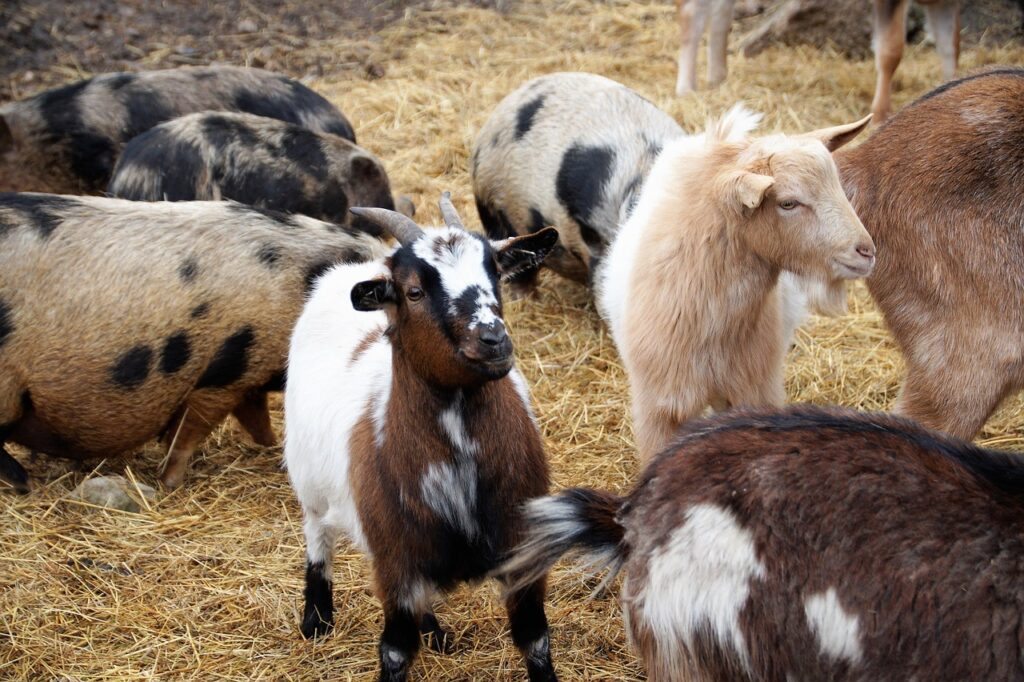
What Kind Of Food Do Goats Need?
Goats are ruminants, which means they have a four-chambered stomach and require a diet that is high in fiber.
Hay
Hay is an important source of fiber and should make up the majority of a goat’s diet. Good quality hay such as timothy, orchard grass, or alfalfa hay can provide the necessary nutrients that goats require. It’s important to provide clean and dry hay to prevent the growth of mold or bacteria.
Fresh pasture
Grazing on fresh pasture is a great way for goats to get exercise and obtain the nutrients they need. However, you should be careful not to let your goats overgraze, as this can lead to soil erosion and reduce the quality of the pasture.
Grain
While hay and pasture should make up the majority of a goat’s diet, grain can be used as a supplement to provide additional nutrients and energy. Corn, oats, and barley are commonly used grains for goats, but it’s important to feed them in moderation as too much grain can cause digestive issues.
Minerals and vitamins
Goats on a homestead need a balanced diet that includes essential minerals and vitamins such as calcium, phosphorus, and salt. You can provide mineral blocks or supplements to ensure they are getting the nutrients they need.
How Much Water Do Goats Need?
As a general rule of thumb, a mature goat requires at least 1-2 gallons of water per day. Pregnant or lactating goats may require more water to support their increased nutritional needs. During hot and dry weather conditions, goats may also require more water to prevent dehydration.
It’s important to provide clean and fresh water at all times, and to regularly clean and refill water containers to prevent the buildup of bacteria and algae. Water should be provided in containers that are large enough for the goats to drink from comfortably and should be placed at a level that is easily accessible to them.
In addition to water, goats on a homestead can also obtain moisture from fresh pasture or hay. However, during dry or cold weather conditions, providing ample water is especially important to ensure that the goats are getting the hydration they need to stay healthy.
Can I Only Have One Goat?
While goats are social animals and generally thrive in groups, it is possible to keep a single goat as a pet if you are able to provide it with adequate attention and care. However, if you do decide to keep a single goat, it’s important to keep in mind that goats are herd animals and may become lonely or develop behavioral problems if they are isolated for long periods of time.
To prevent this, it’s important to spend time with your goat on a regular basis, provide it with plenty of mental and physical stimulation, and consider getting another goat to keep it company if possible.
Having more than one goat is recommended though.
Purchasing Goats
Local farms and breeders
You can look for local farms and breeders in your area that raise goats. These farms may specialize in specific breeds of goats, and they may have goats for sale year-round or seasonally. You can find these farms and breeders by searching online or checking local agricultural listings.
Auctions and sales
Agricultural auctions and sales are another option for purchasing goats. These events typically bring together multiple sellers and buyers, and you can often find a wide variety of goat breeds and ages for sale. You can find these events by searching online or checking local agricultural listings.
Online classifieds
You can also search online classifieds, such as Craigslist or Facebook Marketplace, to find goats for sale in your area. However, it’s important to be cautious when purchasing goats online, as you may not have the opportunity to see the goats in person before making a purchase.
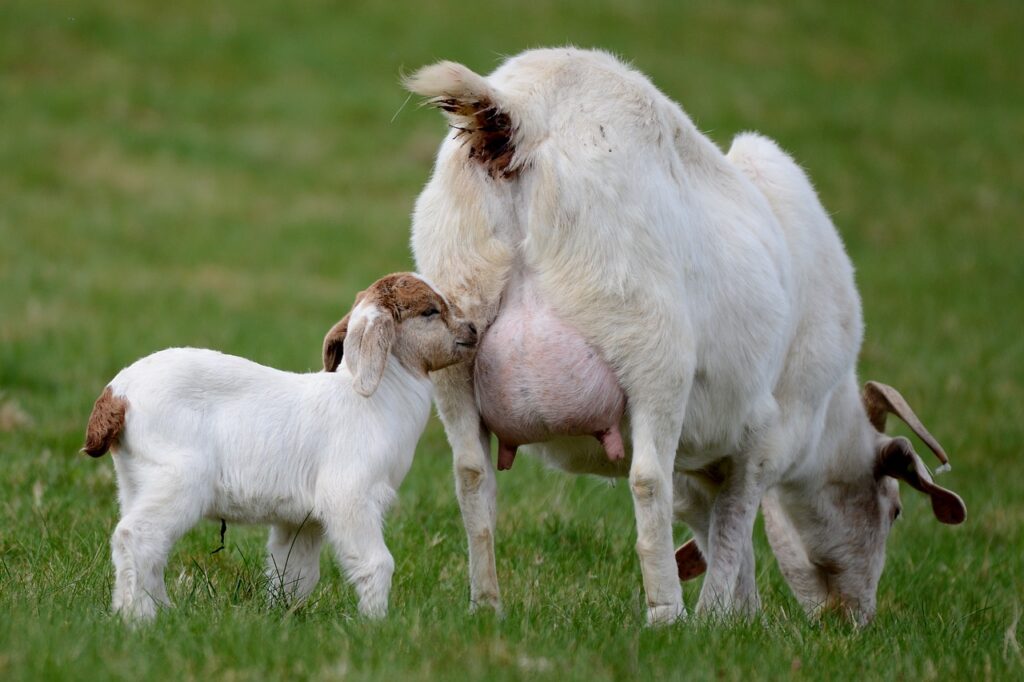
How Often Do Goats Breed?
Female goats can breed every 21-28 days during the breeding season or year-round. However, it’s important to give does a break between pregnancies to allow them to recover and maintain their health. As a general rule of thumb, it’s recommended to breed does once a year or every 18-24 months.
In general, female goats (called does) reach sexual maturity at around 5-8 months of age, and male goats (called bucks) reach sexual maturity at around 4-8 months of age. However, it’s recommended to wait until they are older before breeding to ensure they are mature enough to handle the stress of pregnancy and lactation.
Many breeds of goats are seasonal breeders, meaning they breed naturally during a specific season, typically in the fall or winter. This is known as the breeding season, and it typically lasts around 3-4 months. Some breeds of goats are able to breed year-round, and in some management systems, goats may be bred continuously throughout the year.
How Much Do Goats Poop
Goats are known for producing a significant amount of manure or poop, which can be beneficial for fertilizing soil and improving soil quality. On average, a mature goat can produce between 0.5 and 1.5 pounds of manure per day, depending on the factors mentioned above. This means that a small herd of goats can produce a considerable amount of manure over time, which can be used to fertilize crops or gardens.
Do Goats Have Any Predators?
Goats on a homestead can have several natural predators, depending on their geographic location and habitat.
- Coyotes: Coyotes are a common predator of goats in many areas, especially in rural and suburban environments.
- Mountain lions: In regions with mountain lions, goats may be at risk of predation by these large carnivores.
- Wolves: Wolves can be a threat to goats, particularly in areas where they are present.
- Bears: In areas with black bears or grizzly bears, goats may be vulnerable to predation.
- Dogs: Domestic dogs, as well as wild dogs or feral dogs, can also pose a threat to goats.
- Birds of prey: In some cases, large birds of prey, such as eagles, hawks, and owls, may attack and kill small or young goats.
It’s important to take steps to protect goats from predators, such as fencing and other physical barriers, guard animals (such as dogs), and secure housing at night.
Does My Goat Need To Be Groomed
Regular grooming can help keep goats clean, healthy, and comfortable, and can also reduce the risk of certain health problems. Goats should be brushed regularly to remove dirt, loose hair, and other debris from their coats. This helps keep their skin and coat healthy and free from irritants.
Goat hooves should be trimmed every 6-8 weeks to prevent overgrowth and infection. This is an important task that should not be neglected, as overgrown hooves can cause pain and discomfort and increase the risk of lameness. Regularly checking your goat’s eyes, ears, and nose for discharge or other signs of infection can help catch any health problems early.
While goats are generally clean animals, they may occasionally need a bath to remove stubborn dirt or stains. Use a mild, goat-safe shampoo and be sure to rinse thoroughly to avoid irritation. Some breeds of goats may require hair clipping or trimming to prevent matting or to keep them comfortable in hot weather.
How Long Will My Goat Live?
On average, goats can live for 10 to 12 years, but some goats can live for longer or shorter periods.
The lifespan of goats on a homestead also varies depending on their purpose. For example, dairy goats that are kept for milk production may have a shorter lifespan due to the stress of frequent milking, while meat goats may have a longer lifespan if they are not used for production purposes.
In addition to genetics and purpose, good nutrition, regular veterinary care, and proper management can all play a role in helping goats live longer, healthier lives. By providing your goat with a healthy and stress-free environment, you can help maximize their lifespan and improve their quality of life.
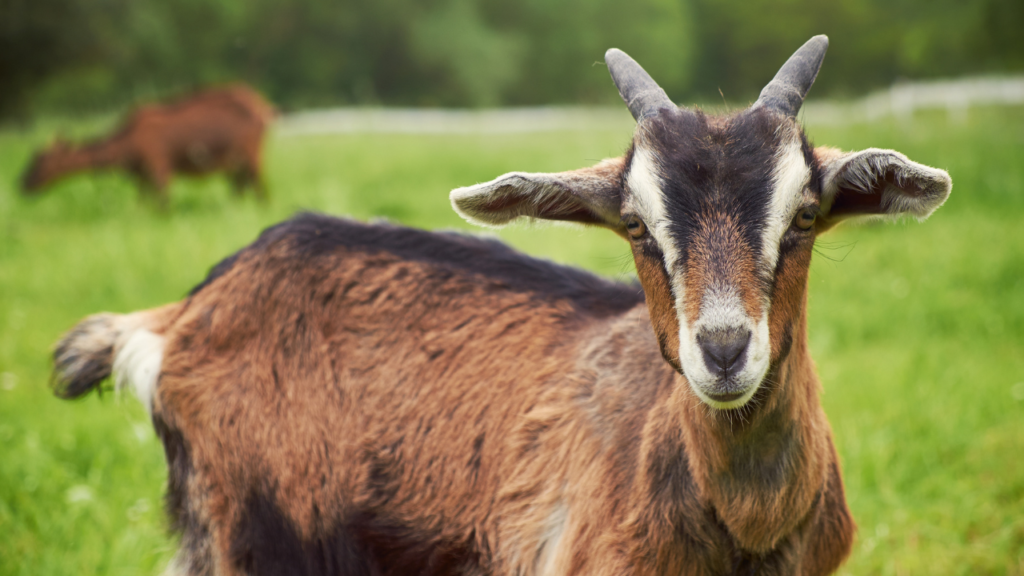
What Diseases Are Goats Prone To?
Goats on a homestead can be prone to several diseases, some of which can be fatal if left untreated. Here are some common diseases that goats may be at risk of:
- Caprine arthritis and encephalitis (CAE): This viral disease affects the joints and nervous system of goats and can lead to chronic pain, lameness, and paralysis.
- Caseous lymphadenitis (CL): This bacterial disease causes abscesses in the lymph nodes and can lead to chronic infections and decreased productivity.
- Contagious ecthyma (Orf): This viral disease causes scabby lesions on the skin and around the mouth and can cause reduced milk production and weight loss.
- Gastrointestinal parasites: Goats are particularly susceptible to gastrointestinal parasites, such as roundworms and coccidia, which can cause diarrhea, anemia, and weight loss.
- Foot rot: This bacterial infection affects the hooves of goats and can cause lameness and pain.
- Pneumonia: Goats can be prone to bacterial and viral pneumonia, which can cause coughing, fever, and respiratory distress.
- Tetanus: This bacterial infection can cause muscle stiffness and spasms, and can be fatal if left untreated.
It’s important to work closely with a veterinarian to develop a disease prevention and management plan for your goats. This may include regular vaccinations, deworming, and monitoring for signs of illness. Good nutrition, proper sanitation, and good management practices can also help prevent disease in your goat herd.
Continue Reading About Goats:
Recent Posts
In general, to harvest your own seeds, you must choose mature, healthy plants, allow seeds to dry out, and remove the seeds when they are completely dry. However, this process will look different for...
A guide on how to store and organize seeds for your garden. Vegetables, flowers, herbs, or anything you are wanting to grow. How to Store Your Seeds Proper storage of garden seeds is essential...
